- Home
- J. D. Robb
Dark in Death Page 15
Dark in Death Read online
Page 15
Please! Settle down in your favorite chair with the beverage of your choice. You’re in for a long, entertaining night of reading!
Of course, I welcome your thoughts, your suggestions, and any recommendations you may have on how I might improve the work.
I understand now, with your help, that the art of writing, of birthing a story takes real sacrifice. I’ve made the sacrifice and, thanks to you, know who I am, and what I was meant to be.
As you’ll see, I’ve taken a risk, as art also requires risk, and made the killer the central character, the protagonist, telling the story through his eyes. It is his blood that is hot, his mind that is cold. And yet … Well, you’ll see!
You are the first to read this labor of love, of sweat and tears. I could not have written it without you, would never have found the courage inside me to make the sacrifices necessary to become what I’d only dreamed of becoming.
Believe me, I will take any and all of your constructive criticism to heart, and do my best to implement your suggestions before I submit Hot Blood, Cold Mind for publication.
I hope, when that time comes, you will take my trembling hand and be my stalwart guide through that exciting process. With gratitude, admiration, and joy,
A. E. Strongbow
Eve sat back with her coffee. “Okay, more than over-the-top. There’s obsession here, and the illusion of a relationship that doesn’t exist and expectations on a personal and professional level that weren’t in any way offered. Return address is a post office box in Brooklyn. We’ll check it out. Are there more?”
“There are, yes, but you should know the first letters were from a post office box in Delaware.”
“Indicating this Strongbow moved to Brooklyn—closer to DeLano. That’s edging over the scary fan line.”
“In the follow-ups, it goes to a giant leap over that line. You’ll see the response from DeLano’s mother there as well.”
“Yeah, I’m looking at it. Quick response this time, coming less than ten after Strongbow’s. Sending the manuscript back, unopened and unread, as DeLano has a firm policy, on advice of her agent and lawyers, not to read unpublished work. Lots of encouragement and congrats on completing the book, blah blah. Lots of good-luck wishes, but a little more careful, just a little distant. Audrey’s no idiot and obviously saw this had crossed that line. And Strongbow responded?”
“Crushed, disappointed. Understood the policy, but believed the connection to DeLano meant they trusted and valued each other as writers. It’s sad, actually, and you’ll read it for yourself, see how the edges start to fray. Audrey didn’t respond.”
“Smart. Cut the cord.”
“Strongbow wrote back at the end of September, shortly after the publication of Sudden Dark. And dark’s the tone.”
“You read it.”
As he did, Eve pushed up to pace.
“ ‘Blaine,’ ” Roarke read,
I opened Sudden Dark with a sense of anticipation. Imagine my shock, imagine the depth of my sense of betrayal as I read your twisted bastardization of my own work. Did you think I wouldn’t see? Did you think I wouldn’t know you’d torn the guts out of Hot Blood, Cold Mind and used its bloody flesh to cover your own inferior work?
How could you? How dare you?
Your thin and pathetically drawn character of Lucius Osgood is so obviously your feeble attempt to make my Evan Quint your own creation. You fool no one!
Do you think making Osgood a struggling artist rather than a successful businessman gives you cover? Do you think giving Osgood a beard disguises him?
I see him, Blaine, and I see you. I see you for what you are. A thief, a liar. How many other far superior writers have you betrayed in this way to build your fame, your fortune?
I trusted you. I believed in you. I sacrificed everything to emulate you.
In the end, you’re nothing. Your work is nothing.
Anyone can copy, Blaine, anyone can cheat. You stole my soul when you stole Hot Blood, Cold Mind. And you murdered it when you tore it to pieces and called it Sudden Dark.
Yes, anyone can copy, and you’ve proven I was right. Sometimes the villain wins.
It’s past time you, Hightower, and Dark learned that.
I will never forgive you,
A. E. Strongbow
“That book’s in the library, right? Sudden Dark?”
“Yes. I can get it for you.”
“Later.” Eve waved that off for now. “If Strongbow’s the killer, she doesn’t start with Sudden Dark, the book that snapped her. She goes back to the beginning. Because that’s orderly and organized. It’s linear.
“Are there any more communications from her?”
“There aren’t, no. At least not under this name. You could be right about her using other names. Don’t you think she’d need to keep the connection?”
“Yeah, I do. I haven’t hit on anybody sending a manuscript to DeLano in my batch, but there’s got to be a few here and there. The response had that sense of ready statement. Policy, agent, lawyers, blah blah. We’ll check out the post office boxes, see what we find. She’d have shut the one in Delaware down when she moved here, shut the Brooklyn one down, at least under the Strongbow name, when she turned on DeLano. But we may get data to follow.”
“You think she’s smarter than that.”
“I think she’s plenty smart. Being delusional doesn’t mean she can’t be plenty smart. She took a long time to stew, to think, to work it all out before the first kill. I’m going to bet she doesn’t just have the next target selected, researched, worked out, but every one of them, down the line.”
“Sacrificing for craft, for art, that’s a common theme—and very often true. Obviously, she sees her sacrifice as great and courageous.”
Eve nodded slowly. “Moving to New York—inspired by DeLano, maybe thinking something in the air in Brooklyn sparked creativity or some shit. If she had a job in Delaware, she probably had to quit if she couldn’t do it long-distance. If she had a family, she either left them or convinced them to relocate. And I’m going with left them, if she had one, because she’s completely self-involved. So unless she had a pot of money, leaving to move here equaled a financial sacrifice. Leaving the familiar, a sacrifice.”
“Reading her letters, I’d say the writing isn’t merely a career hope, even a calling or an aspiration. It’s a kind of religion to her.”
Eve pointed a finger at him, then dropped back down into her chair. “I’m not going to diss writers. I like stories, too. Maybe I mostly like them in vid form, but somebody has to write the story. I know Nadine works hard. I got the clear sense DeLano does. It’s not like they sit there and the words just …”
Eve waved her fingers at the screen.
“I have to write reports, evals, and it can be a pain in the ass to put the data together so it reads clear, so it lines up. But it’s not fucking holy, and you’re right. This one makes it out to be something beyond, above. So she decided DeLano stole her book—which is bogus—which means DeLano committed a big-ass sin. Punishment must follow.”
“Smart she may be. But a sensible person would know several simple facts going in,” Roarke added. “One, Strongbow mentions looking forward to Sudden Dark when she writes DeLano in May of ’59, meaning the book was already titled, certainly already written, as it takes more than the four months between May and its September publication to edit, produce, print, promote, and so on. Yet Strongbow concludes DeLano read her manuscript in May, was so impressed she cobbled together a book using pieces of it, tossed it to her publisher, and everyone managed to get it on the shelves four months later.”
“You’re right. More delusion.”
“And more, I’ll wager the publisher produced advance copies for reviewers and accounts at least three or four months before the on-sale, which would have the book written before Strongbow sent DeLano the manuscript. It would be a major publication,” Roarke explained. “The advance copies are SOP.”
“So St
rongbow knows squat about how publishing works.”
“Which anyone so invested in becoming published should know a bit about. My take? If you want it.”
“I’m sitting here.”
“She dismissed it because it doesn’t fit her story line. It doesn’t make her the victim and heroine, and DeLano—who rejected her manuscript—the villain.”
“Okay.” Eve considered, nodded. “I can go with that. Alternately, she doesn’t know squat because the business part of it isn’t holy. It’s the writing, the creating, and the being published. But the business of publishing doesn’t apply.”
“Also a valid theory.”
“Still, I’d say we could eliminate anyone who works in publishing, anyone who works in DeLano’s publishing house. You can’t dismiss what you absolutely know. And that’s all saying Strongbow is the killer, which we can’t know. She tops the list, no question. But where there’s one loony, there’s usually more. We have to keep going.”
“Understood. It’s all there, though, isn’t it?”
“Yeah, it is. Let’s run A. E. Strongbow, which is going to dead-end because if that’s not an alias, I’ve never heard one.”
“Pseudonym.”
“Same damn thing.” She ran it, got a list of Strongbows with first and middle names matching the initials. “More than I figured, but only a handful in New York, most male. Still, I’m going to run these through if you can keep going with your share.”
“I can and will. Strongbow sounds Native American, doesn’t it?”
“It sounds made-up—but apparently it isn’t for everybody.”
Before they began again, Roarke angled his chair toward her. “Wouldn’t you think if writing, if creating a book equaled a kind of religion, then the name you chose to write under would have some deep, personal meaning?”
Eve stopped, turned her head to look at him. “Maybe it just sounds literary or mysterious. But … The initials, deliberately non–gender specific. Doesn’t want to be boxed? Male writer, female? Just writer?”
“It’s my turn to—” He pointed a finger at her.
“People take an alias because they want to hide—or because they want to be somebody else. And yeah, maybe she takes one—if it’s not her legal name—because it’s a family name, from some ancestor she admired. Or, or, or, and crap.”
She shoved both hands through her hair.
“More work then,” she concluded. “Aaron Edward Strongbow, Bronx address, is six years old. But that doesn’t mean he doesn’t have a third cousin twice removed who’s a homicidal writer wannabe.”
She worked her way through the new list, highlighting a few names for a deeper look, shifted back to the communications to at least make a solid dent in her share.
Roarke interrupted again. “I think I may have found her, April of ’60, under the name of Chris Bundy. Chris,” he commented, “could be male or female, and the writer—e-mail this time—doesn’t say. I’m going with she for consistency. What she does say is she once admired DeLano’s work, as a reader and a writer. But with Sudden Dark, while portions of it were some of the finest writing DeLano had done, the story didn’t hold, and the voice throughout wasn’t consistent. It read as though someone else had written it.”
He paused, glanced at Eve. “She demands DeLano reveal the name of her ghostwriter.”
“Let’s flag that one.”
“There’s more—it’s a fairly lengthy rant. She asks: Isn’t it past time to add some realism? For both Dark and Hightower to fail, and the villain to triumph? To have real impact, to gain immortality, fiction has to reflect life, the writer must make sacrifices and take risks to achieve greatness.”
“Okay, androgynous first name, claims to be a writer, some key words, and a pretty steady series of bitch slaps. It rings.”
Roarke wound his finger at Eve for another hit of coffee. “And on the next with this name—coming in July—a different e-mail address. The first—I checked—opened and closed the day the e-mail was written. I’ll run that down in a bit,” he said as Eve dumped more coffee into both of their mugs. “This one did the same, and claims to have it from very reliable sources that DeLano uses ghosts and gullible, even desperate, aspiring writers to do the bulk of the writing, and cheats the public. Again demands DeLano admit this and reveal the names of the ghosts. Even with them, DeLano is incapable of creating a villain who doesn’t make sloppy mistakes that lead the somewhat inept protagonists to his doorstep.”
He glanced over at Eve. “It ends with: You, Blaine, are a thief and a liar as well as a panderer to your undemanding and unsuspecting fans. Remember, sometimes the villain wins.”
Eve drummed her fingers on her knee, frowned. “You’re hogging all the luck tonight. Let’s run them with Strongbow’s for syntax and style.”
“Done,” he said with a faint smile. “Eighty-three-point-four probability they were all written by the same person.”
“Yeah, hogging the luck. Can you use what you’re hogging to get me anything from the accounts?”
“We’ll see what we can do.”
If there was something to find, she thought, he’d find it. She opted to multitask, increase her odds of snagging some of that luck. She ran the Strongbow names on auto while she ordered a search for any communication matching syntax and style with the two Roarke found with an above fifty percent probability.
“Hit. Another eighty percent plus probability. Letter, not e-mail, no return address. Jesse Oaks. Wait.” Eve closed her eyes a moment. “Bundy—Ted Bundy, twentieth-century serial killer. Oaks—Stan K. Oaks, twenty-first-century serial killer.”
“I sense a theme,” Roarke murmured.
“Yeah. Killing’s part of that religion now. Still harping on Sudden Dark. Going on about inconsistency of voice in the book, and claiming it as proof DeLano doesn’t write solo. Demands she reveals the name of her cowriter. Pushes harder on the Dark character here, saying the character is obviously an extension of DeLano’s own ego, and thereby unrealistic. And a reprise of the villain as superior theme. ‘Realism demands Deann Dark/your ego face an adversary who triumphs. Only then will the character created from your limited understanding and need to inflate your own vanity truly comprehend the complexities of the killer, and embrace the villain within and without.’ ”
“That’s the next step, isn’t it?” Roarke commented. “Conflating Dark and DeLano. DeLano is now the character, Strongbow the adversary.”
“Rewrite the scenes, book by book. I need to send these to Mira. She’s got one bat-shit crazy head to shrink.”
“Crazy it may be, but, as you said, it’s sharp as well. The e-mails came from a mobile device, and my conclusion is a clone. Unregistered, but no flag by CompuGuard, which tells me she cloned it. Most likely picked up a couple of drop ’links on the street, cloned one to the other, which takes some skill. Opened the account, sent the e-mail, closed the account, and shut down the ’link—most likely to rework it so the second e-mail appears to be sent not only from another account, but from another ’link.”
“That’s a lot of trouble,” Eve mused. “If she bought two unregistered, why not just use each one, toss it after use?”
“Cheaper this way, if you’ve got the patience and the savvy. You could, potentially, rework the two endlessly. If one’s flagged, you’ve altered it before it can be traced. But you have to be good, and fast, to do that. Easier to shut it down, wipe it, then you’ve time to switch components. And if you’re very clever, you’ve picked up a couple of universal repair kits and you work in those parts.”
“Sounds like experience talking.”
Comfortable, he sipped his coffee. “Well now, there was a time when I had to watch my pennies, so to speak, so the time and effort were easier to come by than the scratch. There are far easier ways to avoid a flag or a trace, but this would be the most economical.”
“Which indicates she needs to economize. A couple of decent drop ’links? It’s an investment.”
; “It is, which is why I, watching those pennies, preferred stealing them.”
She let out a sound between a laugh and a snort. “You just liked stealing.”
“Ah, so I did. Very much.”
“The last thing you stole, and when.”
“Other than your heart?”
Rolling her eyes, she poured more coffee. “Professionally. For profit.”
“That would be a strange and fascinating little still life by an underrated painter named Andre Mendini who, in despair at being underrated, leaped into the Seine and drowned in 2027 or ’28—I’m not quite sure now. In any case his fame subsequently rocketed, and his paintings became of great interest to collectors in the decades following. Persimmons by Candlelight—”
“Now you’re just bullshitting.”
Roarke tapped a hand to his heart. “Absolutely not. The strange and fascinating Persimmons by Candlelight was generously lent in 2056 for an exhibition in the d’Orsay. From there, it was stolen on behest of a collector who coveted it for his private collection, where it remained until 2057, when it mysteriously reappeared at another exhibition of Mendini’s works at the Smithsonian.”
“You stole it twice?”
“Well, the first was for a fee as well as the fun, but I found myself regretting the job when I read about the daughter of the original donor who, at only eleven, had a deep attachment to that particular painting.”
“The kid liked persimmons?”
“Apparently as painted by Mendini. It had, in fact, been loaned out in her name. My client simply coveted it, and kept it for his own pleasure. The young girl loved it, and mourned the loss. So I returned it to her.”
“Softy.”
“Guilty. Plus stealing it back, then breaking in to the museum to return it? Vastly entertaining.”
He sighed it away.
“And a handful of months later, while I was contemplating the Baroness of Mallow’s emeralds, and whether I should vastly entertain myself by relieving her of them, I met a cop who interested me a great deal more than emeralds.”

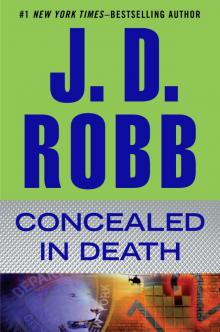 Concealed in Death
Concealed in Death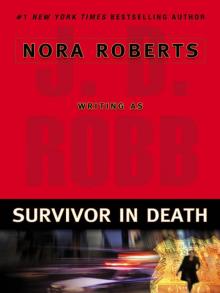 Survivor in Death
Survivor in Death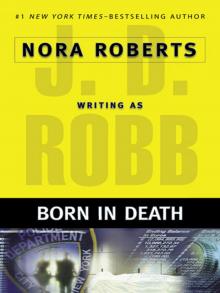 Born in Death
Born in Death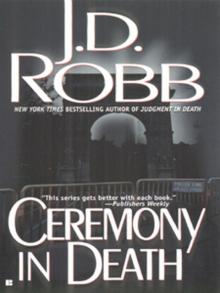 Ceremony in Death
Ceremony in Death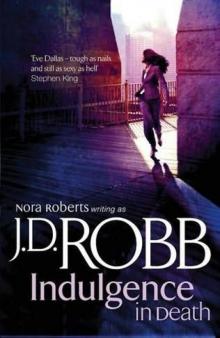 Indulgence in Death
Indulgence in Death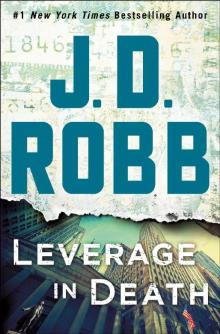 Leverage in Death
Leverage in Death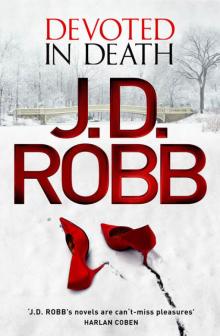 Devoted in Death
Devoted in Death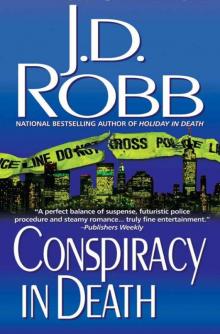 Conspiracy in Death
Conspiracy in Death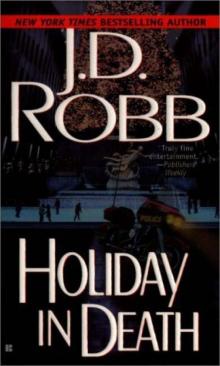 Holiday in Death
Holiday in Death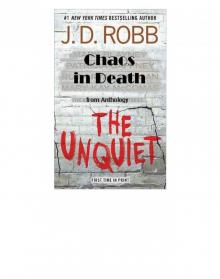 The Unquiet
The Unquiet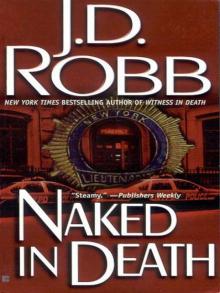 Naked in Death
Naked in Death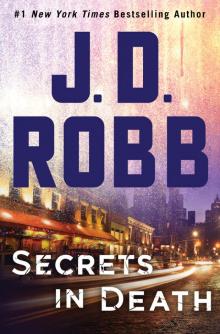 Secrets in Death
Secrets in Death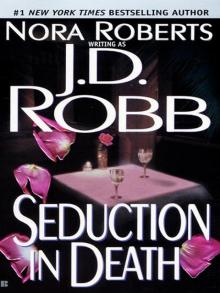 Seduction in Death
Seduction in Death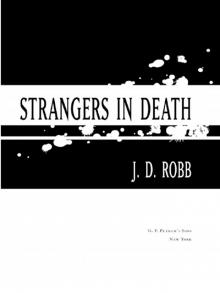 Strangers in Death
Strangers in Death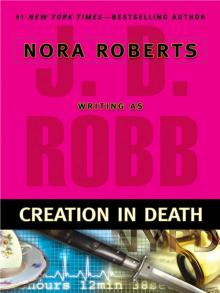 Creation in Death
Creation in Death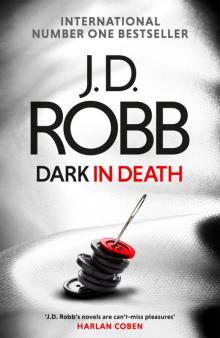 Dark in Death
Dark in Death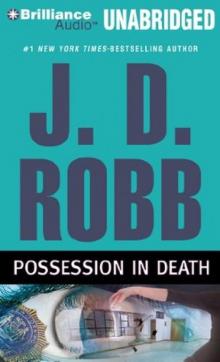 Possession in Death
Possession in Death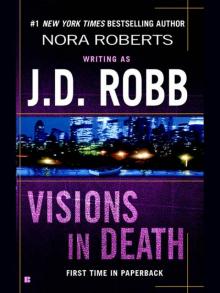 Visions in Death
Visions in Death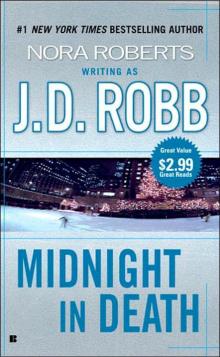 Midnight in Death
Midnight in Death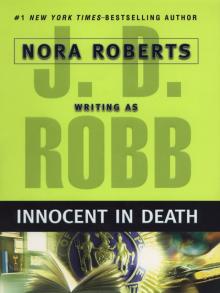 Innocent in Death
Innocent in Death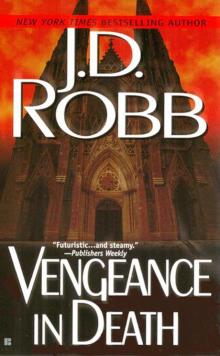 Vengeance in Death
Vengeance in Death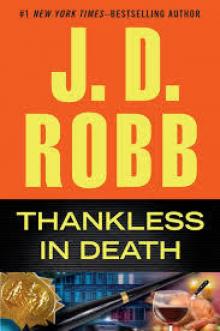 Thankless in Death
Thankless in Death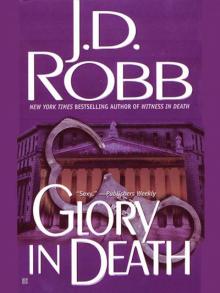 Glory in Death
Glory in Death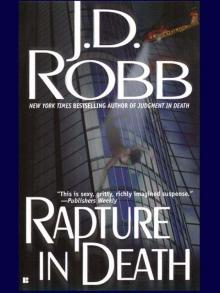 Rapture in Death
Rapture in Death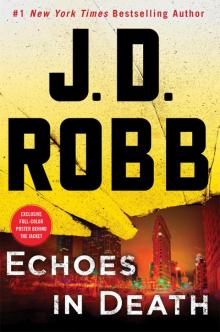 Echoes in Death
Echoes in Death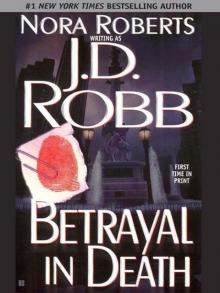 Betrayal in Death
Betrayal in Death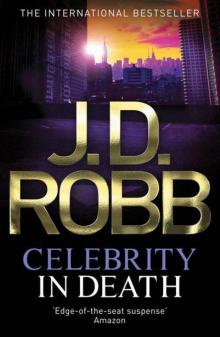 Celebrity in Death
Celebrity in Death Immortal in Death
Immortal in Death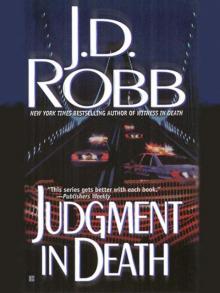 Judgment in Death
Judgment in Death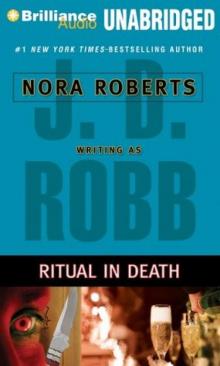 Ritual in Death
Ritual in Death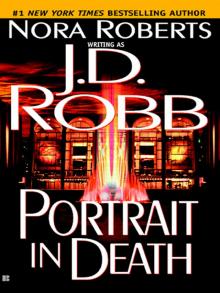 Portrait in Death
Portrait in Death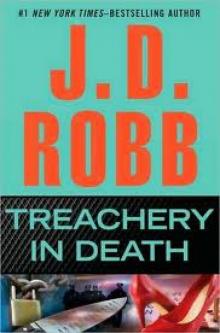 Treachery in Death
Treachery in Death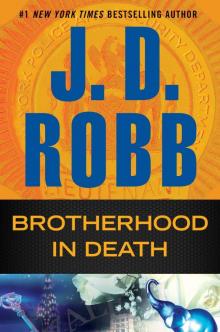 Brotherhood in Death
Brotherhood in Death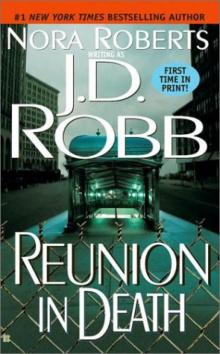 Reunion in Death
Reunion in Death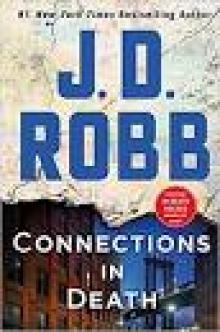 Connections in Death: An Eve Dallas Novel
Connections in Death: An Eve Dallas Novel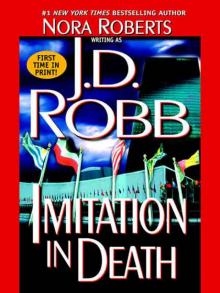 Imitation in Death
Imitation in Death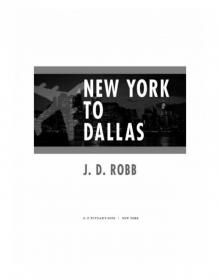 New York to Dallas
New York to Dallas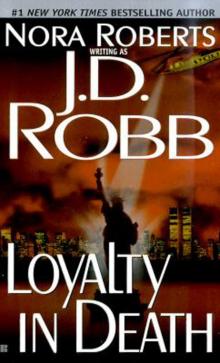 Loyalty in Death
Loyalty in Death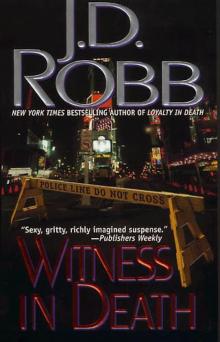 Witness in Death
Witness in Death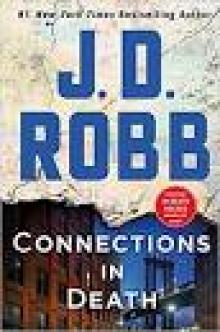 Connections in Death
Connections in Death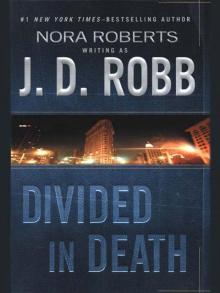 Divided in Death
Divided in Death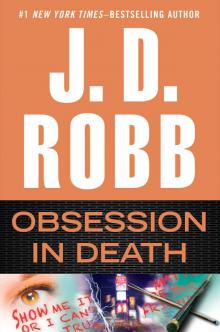 Obsession in Death
Obsession in Death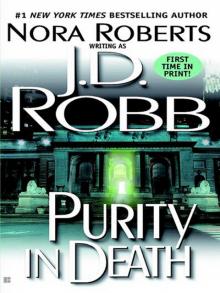 Purity in Death
Purity in Death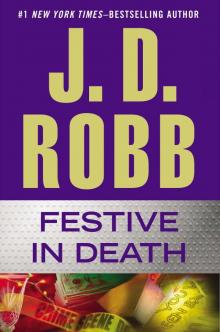 Festive in Death
Festive in Death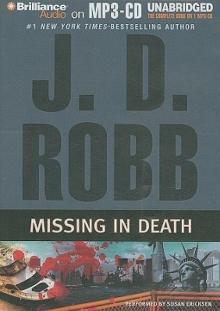 Missing in Death
Missing in Death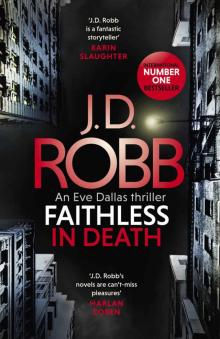 Faithless in Death: An Eve Dallas Thriller (Book 52)
Faithless in Death: An Eve Dallas Thriller (Book 52)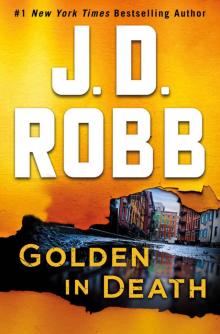 Golden in Death
Golden in Death The In Death Christmas Collection
The In Death Christmas Collection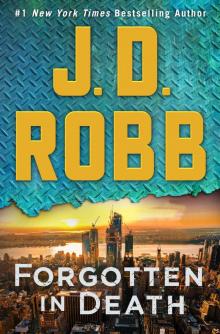 Forgotten in Death
Forgotten in Death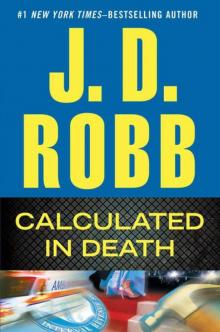 Calculated in Death
Calculated in Death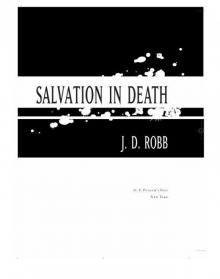 Salvation in Death
Salvation in Death Interlude in Death
Interlude in Death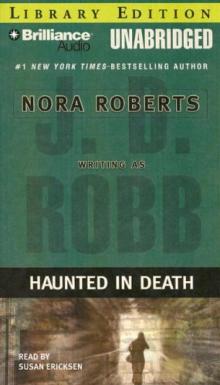 Haunted in Death
Haunted in Death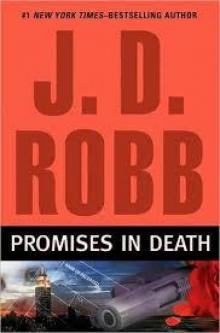 Promises in Death
Promises in Death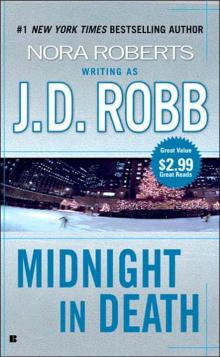 In Death 07.5 - Midnight in Death
In Death 07.5 - Midnight in Death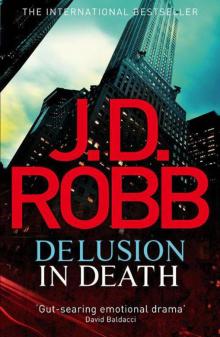 44 Delusion in Death
44 Delusion in Death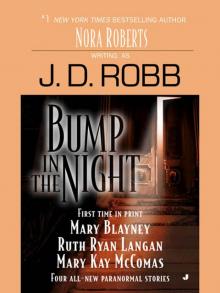 Bump in the Night
Bump in the Night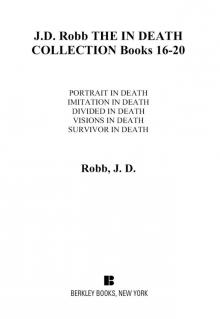 The In Death Collection, Books 16-20
The In Death Collection, Books 16-20![[In Death 17] - Imitation in Death Read online](http://i1.bookreadfree.com/i/03/20/in_death_17_-_imitation_in_death_preview.jpg) [In Death 17] - Imitation in Death
[In Death 17] - Imitation in Death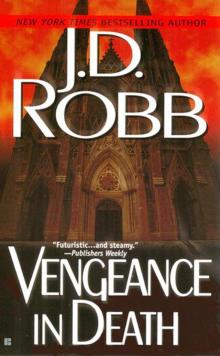 In Death 06 - Vengeance in Death
In Death 06 - Vengeance in Death Dead Of Night
Dead Of Night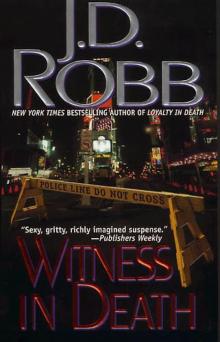 In Death 10 - Witness in Death
In Death 10 - Witness in Death![[In Death 16] - Portrait in Death Read online](http://i1.bookreadfree.com/i1/03/27/in_death_16_-_portrait_in_death_preview.jpg) [In Death 16] - Portrait in Death
[In Death 16] - Portrait in Death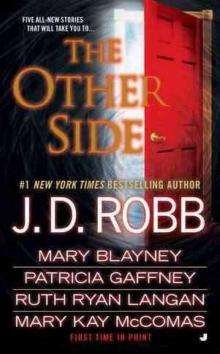 Possession in Death edahr-39
Possession in Death edahr-39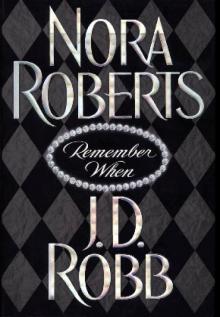 Remember When edahr-20
Remember When edahr-20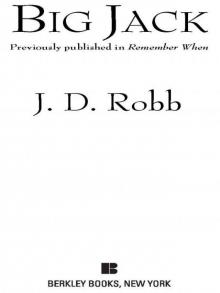 Big Jack
Big Jack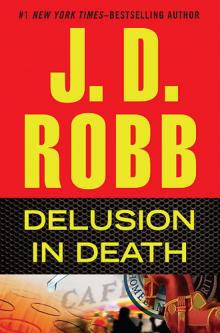 Delusion in Death edahr-44
Delusion in Death edahr-44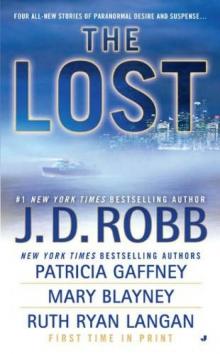 Missing in Death edahr-36
Missing in Death edahr-36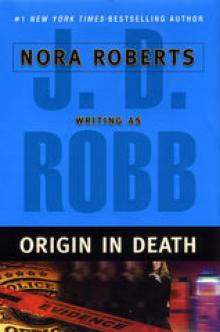 Origin in Death edahr-24
Origin in Death edahr-24![[In Death 18] - Divided in Death Read online](http://i1.bookreadfree.com/i1/04/03/in_death_18_-_divided_in_death_preview.jpg) [In Death 18] - Divided in Death
[In Death 18] - Divided in Death The Lost
The Lost![[In Death 05] - Ceremony in Death Read online](http://i1.bookreadfree.com/i1/04/01/in_death_05_-_ceremony_in_death_preview.jpg) [In Death 05] - Ceremony in Death
[In Death 05] - Ceremony in Death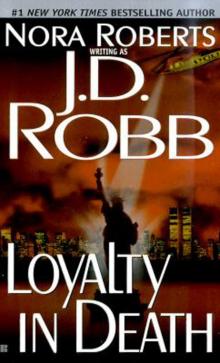 In Death 09 - Loyalty in Death
In Death 09 - Loyalty in Death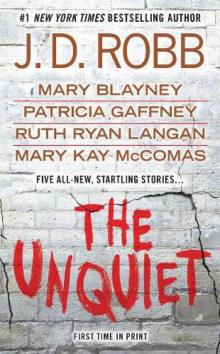 Chaos in Death edahr-42
Chaos in Death edahr-42 In Death 12.5 - Interlude in Death
In Death 12.5 - Interlude in Death![In Death [47] Leverage in Death Read online](http://i1.bookreadfree.com/i1/04/01/in_death_47_leverage_in_death_preview.jpg) In Death [47] Leverage in Death
In Death [47] Leverage in Death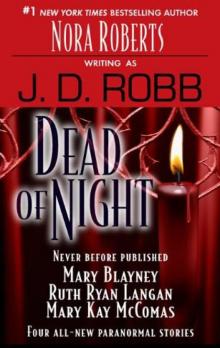 In Death - 24.50 - Dead of Night
In Death - 24.50 - Dead of Night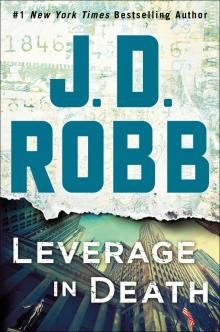 Leverage in Death--An Eve Dallas Novel
Leverage in Death--An Eve Dallas Novel![[In Death 24] - Innocent in Death Read online](http://i1.bookreadfree.com/i1/04/05/in_death_24_-_innocent_in_death_preview.jpg) [In Death 24] - Innocent in Death
[In Death 24] - Innocent in Death![[In Death 15] - Purity in Death Read online](http://i1.bookreadfree.com/i1/04/05/in_death_15_-_purity_in_death_preview.jpg) [In Death 15] - Purity in Death
[In Death 15] - Purity in Death The In Death Collection, Books 26-29
The In Death Collection, Books 26-29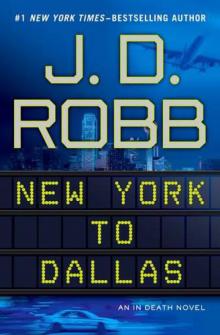 New York to Dallas edahr-41
New York to Dallas edahr-41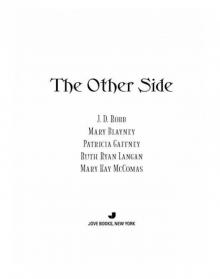 The Other Side
The Other Side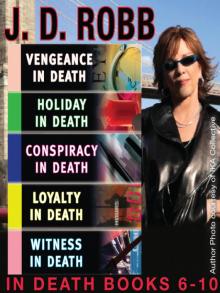 The In Death Collection 06-10
The In Death Collection 06-10![[In Death 08] - Conspiracy in Death Read online](http://i1.bookreadfree.com/i2/04/05/in_death_08_-_conspiracy_in_death_preview.jpg) [In Death 08] - Conspiracy in Death
[In Death 08] - Conspiracy in Death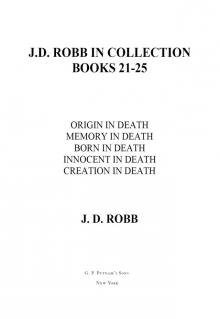 The In Death Collection, Books 21-25
The In Death Collection, Books 21-25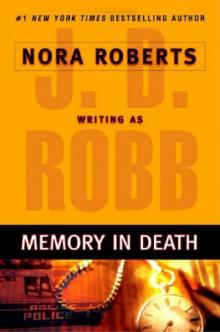 Memory in Death edahr-25
Memory in Death edahr-25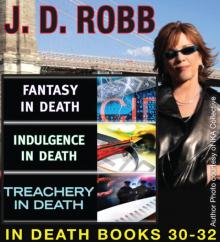 The In Death Collection, Books 30-32
The In Death Collection, Books 30-32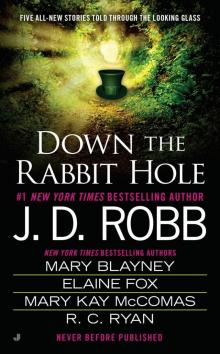 Down the Rabbit Hole
Down the Rabbit Hole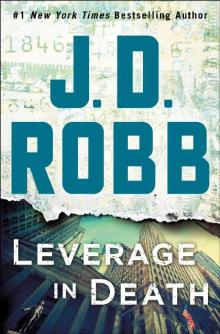 Leverage in Death: An Eve Dallas Novel (In Death, Book 47)
Leverage in Death: An Eve Dallas Novel (In Death, Book 47)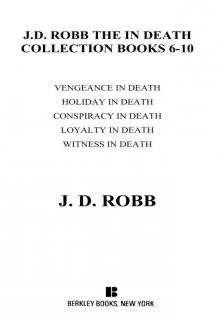 The In Death Collection, Books 6-10
The In Death Collection, Books 6-10 The In Death Collection, Books 11-15
The In Death Collection, Books 11-15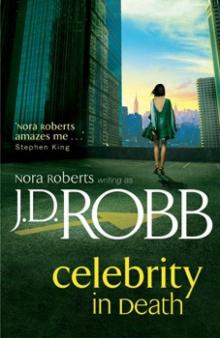 Celebrity in Death edahr-43
Celebrity in Death edahr-43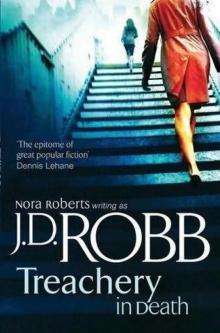 Treachery in Death edahr-40
Treachery in Death edahr-40![[In Death 12] - Betrayal in Death Read online](http://i1.bookreadfree.com/i2/04/13/in_death_12_-_betrayal_in_death_preview.jpg) [In Death 12] - Betrayal in Death
[In Death 12] - Betrayal in Death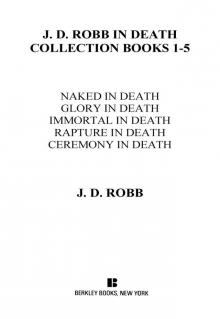 The In Death Collection, Books 1-5
The In Death Collection, Books 1-5